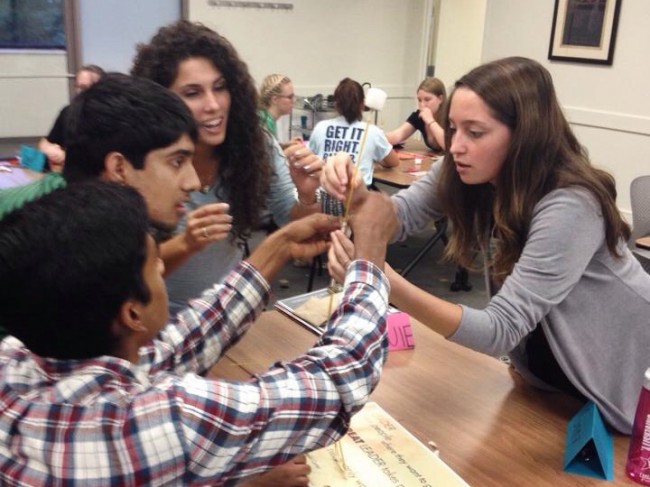Loading ACCESS… 50% Completed
I find myself at the mid-point of the EVOLVE leadership development program, introduced in a previous post. In clusters of four and as a cohort of 36, we completed A for Accountable, C for Collaborative, and a second C for Communicative. Each letter is part of an acronym that encapsulates the Office of Student Leadership Development’s philosophy of “leadership excellence.” (The next three letters stand for Ethical, Service-Oriented, and Supportive of All.)
A Leader is Accountable
Accountability, the theme of our second EVOLVE meeting, is taking responsibility for personal behavior by admitting and apologizing for mistakes, rectifying the situation, and accepting any consequences (OSLD).
In a general sense, accountable actions are those that benefit society, and every day we must hold ourselves and others accountable. For leaders, the most essential part of this is to do what you said you would do. Personally, I struggle with punctuality, so now I’m focusing on arriving to meetings early or on time. This applies to events in which I have some sort of leadership position, but also just to getting coffee with a friend. (I’m what this article describes as “The Producer,” who tries to fit too many things into a short amount of time and “consistently underestimating the amount of time their tasks will take.” That’s pretty predictable based on one my top themes, Achiever, although it’s definitely part of the dark side of wanting to do so many things.)
When I relate this leadership excellence theme to Vanderbilt’s campus, I think first about the Honor Code. Even the name of this plagiarism/cheating policy speaks to the concept of accountability. We all signed the Code as first-years, but what does it mean on a day-to-day basis? To me it means doing the best work you can, to learn as much as you can, and accepting the consequences when you fail to meet your professor’s expectations. Everyone has semesters when they couldn’t avoid taking 17 or 18 hours, or they have to hold down a job, or they just had a terrible headache one day. When it happens to you, giving yourself an unfair advantage is not going to make it any better.
A Leader Collaborates
The next theme is collaboration. A leader understands, values, and acts on the importance of working with others toward a common objective through sharing ideas and delegating tasks (OSLD).
The EVOLVE session kicked off with a challenging task: to construct the tallest free-standing structure possible, using only 20 strands of dry spaghetti, masking tape, string. The kicker? It’s got to support a marshmallow. My group’s tower stood 18 inches tall, taking second place, while the winning group’s spaghetti structure topped 23 inches.
Tom Wujec, in describing the implications of the so-called Marshmallow Challenge, highlights the importance of listening to all ideas in the group. We certainly learned this lesson as many of us watched our towers topple and collapse under the weight of a single marshmallow.

Reflecting on the role I took in our marshmallow-building group, I realized that I usually verbally encouraged others and helped them implement their ideas (the Activator in me?), but I was essentially more focused on the task than on the group. I also get very excitable, and I’m sure that if the model were my idea, I might even become controlling. When a student joined our group late, none of us asked her whether she had any ideas; we just plowed ahead with our current model. It wasn’t really a problem, but it’s good to understand how I tend to operate in a collaborative group.
We left the session with these words from Thomas Crum: “Personality differences and abilities contribute to a masterpiece that is larger than any one person’s vision.”
On Vanderbilt’s campus, the main issue is not so much interpersonal group collaboration, but collaboration between student organizations. Some groups are similar to each other, and if they don’t collaborate when planning events, they waste the potential of sharing funding, advertising, and (duh) attendees. Groups like the Multicultural Leadership Council, on the other hand, are winning the collaboration game.
A Leader is Communicative
One of the most difficult aspects of strong leadership is communication. We faced this challenge first-hand as we gave each other extemporaneous two-minute speeches (Dr. English would be so proud of me), analyzed visual images, and practiced editing our own writing from a stream-of-consciousness exercise.
It’s pretty obvious why people have to be able to communicate well. Communication can make or break your efforts to persuade, inform, or entertain others, and as a leader, it becomes even more important.
In this session, OSLD staff Brandie Van Order presented an Ignite talk, which is 5 minutes’ worth of 20-second slides. She also gave us as EVOLVE participants the job of creating our own presentation about leadership, which will form as a sort of capstone for the program. So as I proceed with the next three weeks (C, E, and S), I’ll be thinking about who I want to be as a leader and which aspects of the leadership excellence philosophy statement I need to work on most, and then put it all together coherently for my peers.
So there you have it: accountability, collaboration, communication. And this is only half of what it takes to be a strong leader!